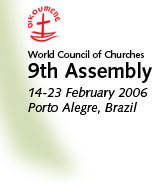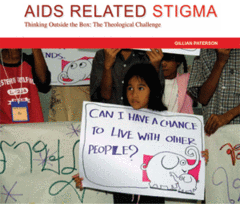 |
WCC > Home > News & media > Features | ||||
| About the assembly | Programme | Theme & issues | News & media | |||||
 |
|
||||
|
18.02.06
AIDS Youth urge action for protection from HIVChurches need to build youth participation so that young people can
make informed decisions to protect themselves against HIV/AIDS.
by Elizabeth Lobulu (*)
More articles and free photos at
"It is now or never," remarked Dr Christoph Benn during an ecumenical conversation on the theme of HIV/AIDS at the 9th Assembly of the World Council of Churches in Porto Alegre, Brazil. A resource person from Germany with broad international experience in public health, Benn was giving an overview of the crisis and its impact worldwide.
"AIDS is the only disease in the world that has led to solidarity between the rich countries and people in the poor countries, in a magnitude that has never been manifested for any other disease." He observed that "the disease was so big that it demanded global action". If churches work individually, they are bound to fail. He described collaboration with governments, ecumenical bodies and among churches as the only way to reverse the spread of HIV.
He said that, in some parts of the world, life expectancy was reduced by 20 years as a result of AIDS. Disempowerment and conditions of weakness, like poverty and gender inequality, made women particularly vulnarable to AIDS.
Some people taking part in the ecumenical conversation reiterated the observation that churches had been "silent on the issue of AIDS and came too late to the scene". Young people asserted that they were let down because churches did not give them necessary information so that they could take action to protect themselves from the disease.
Dr Benn expected the church to be in the forefront in fighting for people's right to life. "All were born equal," he said, "and all have a right to live".
Gracia Quiroga, a young woman from Bolivia, said her government did not give priority to HIV prevention campaigns, yet poverty leads many girls to opt for prostitution because they remain uninformed of the dangers. She underlined what Dr. Benn said: "AIDS thrives in weakness," including the contexts of poverty and war.
AIDS claims the lives of more young people than of other age groups. Youths said they wanted "to be involved more in brainstorming on action to be taken, instead of being used as mere mobilization tools".
Rev. Dr Gideon Byamugisha, an Anglican canon from Uganda, said that "The world would be a safer, healthier and better place if churches were more involved to fight HIV/AIDS."
He argued that "most of the HIV/AIDS-related diseases and deaths are preventable, postponable, reversible and controllable". However, he posed this question: "Have we as individuals, churches, international bodies and an ecumenical movement done everything possible to fight this disease?"
Canon Byamugisha, who learned that he was HIV-positive after the death of his wife, is the founder of ANERELA+, the African Network of Religious Leaders Living with or Personally Affected by HIV and AIDS. ANERELA+ aims at mutual empowerment for its members and reduction of stigmatization of HIV-positive people in society.
Another church-based organization, the Ecumenical HIV/AIDS Initiative in Africa (EHAIA), was established by the World Council of Churches to work with churches in sub-Sahara Africa to fight AIDS. It has five sub-regional offices in Africa.
Among other things, EHAIA distributes resources in churches and society, including guidelines on pastoral counselling as a Christian response to people living with HIV/AIDS. These resources include a handbook for Africa on HIV/AIDS, "Sensitive Sermon Guidelines and Liturgy", a CD with a multi-lingual collection of publications on HIV/AIDS, and other publications for study such as "Facing AIDS", with a foreword by WCC general secretary Samuel Kobia. He observes that "part of the problem is the commodification of human relations. Globalization greatly exacerbates this problem by promoting a consumer mentality" through which sexuality is reduced to a commodity.
Linda Hartke, coordinator of the Ecumenical Advocacy Alliance (EAA), said the theme of EAA's 2005 - 2008 campaign is "Keep the Promise". It presses governments to fulfil what they previously have pledged to do concerning HIV/AIDS. The Geneva-based alliance is a broad ecumenical network for international cooperation in advocacy and lobbying on global trade and HIV and AIDS. At least 95 churches and church-related organizations have joined the Alliance.
Among other things, it advocates against stigma and in favour of the rights and dignity of people living with HIV/AIDS. The EAA calls for an attitude of care and solidarity that rejects all forms of stigmatization and discrimination. Hartke said one idea was to educate religious leaders concerning theological perspectives on AIDS-related stigma.
Another goal of the Alliance is advocacy for accountability to ensure that governments and policy makers meet the goals they have already agreed to seek in the fight against HIV and AIDS. Towards this end, an AIDS summit has been planned to take place in June 2006 at the United Nations in New York to receive feedback on how governments have kept or failed to keep their promises.
The EAA plans to launch a curriculum on AIDS, targeting children aged 11 to 16, at the 9th WCC Assembly in Porto Alegre, Brazil. Versions have been prepared in English, French, Portuguese and Spanish. This curriculum is part of the EAA's prevention activities addressing root causes of vulnerability. Special attention is paid to women and children.
Rev. Dr Veikko Munyika, chairperson of the steering committee of the Churches United Against HIV and AIDS in Southern and East Africa (CUAHA), said his organization's work has been hindered because church leaders have been slow to accept HIV issues, as many have lacked correct information on what HIV/AIDS is all about.
CUAHA, with offices in Dar es Salaam, Tanzania and Helsinki, Finland, is a partnership of churches and other faith-based organizations in Africa and Finland. This partnership has a broad ecumenical base, including Anglican, Catholic, Lutheran, Methodist, Orthodox and Pentecostal churches.
[939 words]
(*) Elizabeth Lobulu is coordinator for communication with the Evangelical Lutheran Church in Tanzania. She is serving as coopted staff in the WCC News Team during the 9th Assembly in Porto Alegre, Brazil 2006.
Assembly website:www.wcc-assembly.info
Contact in Porto Alegre:+55 / 51 8419.2169
|
|||
|
|
|


